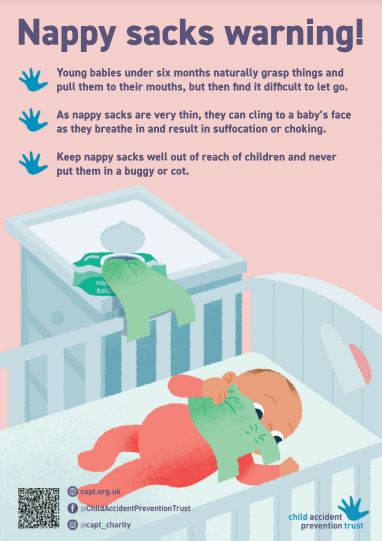Danger on the changing mat
Imagine keeping a bunch of carrier bags within baby’s reach on the changing mat, under the cot mattress or knocking around your children’s bedroom floor – you just wouldn’t would you?
Well, actually, it’s not so far-fetched. Nappy sacks are pretty much essential kit for parents of babies and young children nowadays. They’re cheap, hugely convenient for dealing with soiled disposable nappies and some are even scented to mask the smell of the poo.
Great – but here’s the rub. Yes, like carrier bags, they’re made of plastic. Unlike carrier bags however, they:
- don’t carry a warning;
- are small and flimsy, so not as noisy – you may not know if your baby’s got hold of one;
- are very thin so can easily cling to the face of a baby as it inhales and a young baby will be unable to pull it away;
- are likely to be kept within reach of babies and children, because they’re used for nappy changing.
Young babies under six months are at greatest risk of suffocation from nappy sacks. This is because they naturally grasp things and pull them to their mouths, but then find it difficult to let go.
Remember
Suffocation is not the only risk – choking can also happen if a baby inhales a bag.
- Always keep nappy sacks well out of reach of babies and never put them in a cot, pram or buggy.
- Babies and young children don’t have the control that adults have over their bodies. They can wriggle and squirm but it is harder for them to move out of a dangerous situation.
Did you know?
- Asphyxia (which also includes choking and strangulation) is the third most common cause of child accident deaths in the UK. Most of these accidents happen to children under 5.
- It takes just a few minutes for a baby to suffocate, and they are too weak to move themselves out of a position where they can’t breathe.
Visit the Child Accident Prevention Trust website to find out more



